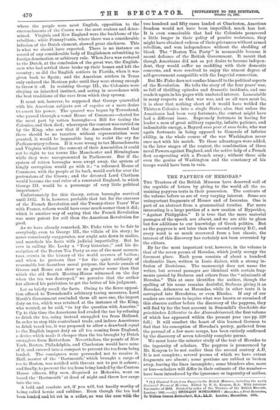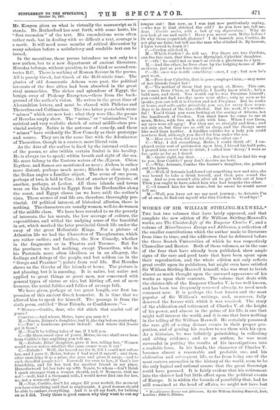THE PAPYRUS OF HERO DAS.*
THE Trustees of the British Museum have deserved well of the republic of letters by giving to the world all the re- maining papyrus texts in their possession. The contents of the volume before us are of very varying interest. Some are unimportant fragments of Homer and of Isocrates. One is part of an abstract from a grammatical treatise. Far more interesting is a large portion of a new oration of Hyperides, "Against Philippides." It is true that the more material passages of the speech are absent, and we are able to glean but few additions to our knowledge of Greek politics. But as the papyrus is not later than the second century B.C., and every word is so much recovered from a lost classic, the interest of this discovery has certainly not been overrated by the editors.
By far the most important text, however, in the volume is that of the seven poems of Herodas, which justly occupy the foremost place. Each poem consists of about a hundred eholiambic lines, written in Ionic dialect, with a strong in- fusion of Doricisms. The manuscript does not name the writer, but several passages are identical with certain frag- ments quoted by Stobmus and others from the " mimiambi of Herodas." This at once identifies the author, though the spelling of his name remains doubtful, Stokeus giving it as Herodas, Athemeus as Herondas, while in other texts it is corrupted into Herodotus, or even Rhodas. If any of our readers are curious to inquire what was known or surmised of this obscure author before the discovery of the papyrus, they will find by far the best account in Susemihl's Geschichte der griechischen Litteratur in der Alexandrinerzeit, the first volume of which has appeared within the present year (see pp. 229 foil.) It will comfort the heart of this learned German to find that his conception of Herodas's poetry, gathered from the perusal of a few mere scraps, has been entirely confirmed by the discovery of seven tolerably complete poems.
We must leave the minuter study of the text of Herodas to the ingenuity of scholars. The papyrus is pronounced by Mr. Kenyon to be not earlier than the second century A.D. It is not complete ; several poems of which we have extant fragments are absent ; some portions are rubbed or broken away, leaving the lines incomplete ; some blunders also, more or less—scholars will differ in their estimate of the number— have been introduced by the ignorance or ingenuity of scribes.
• (1.) Classical Texts from Papyri in the British Museum, including the newly discovered Poems of "(erode',. Edited by F. G. Kenyon, M.A. With Autotype Fue-similes of MSS. Printed by order of the Trustees of the British Museum. London : 1891.—(2.) HPONAOT MIMIAMBOI :_Herondas, a First Recension.
By William Qualm Rutherford, LL,D. London; Macmillan. 1881.
Mr. Kenyon gives us what is virtually the manuscript as it stands. Dr. Rutherford has sent forth, with some haste, his "first recension" of the text. His emendations seem often rather rash, but in dealing with so difficult a text, courage is a merit. It will need some months of critical discussion by many scholars before a satisfactory and readable text can be issued.
In the meantime, these poems introduce us not only to a new author, but to a new department of ancient literature. Herodas belongs, without question, to the third or second cen- turies B.C. There is nothing of Roman flavour in the poems. All is purely Greek, but Greek of the Hellenistic time. The glories of old democratic Athens were past, the political interests of the free cities had been absorbed in the great rival monarchies. The riches and splendour of Egypt, the benign sway of Ptolemy Euergetes,—these form the back- ground of the author's vision. He writes in the great time of Alexandrian letters, and must be classed with Philetas and Theocritus and Callimachus. The two latter poets both wrote "mimes" which are now lost : what they were like, the poems of Herodas amply show. The "mime," or " mimia,mbus," is a satirical and very realistic sketch of actual middle-class pro- vincial society. Satire is the outcome of comedy, and these "mimes" have evidently the New Comedy as their prototype and source. They are in the same line with the Adoniazusw of Theocritus, though in a coarser, more literal vein.
As the date of the author is fixed by the internal evidence of the poems, so also (within certain limits) is his locality.
Tie is always (so to speak) within breath and sight of the sea. He must belong to the Eastern waters of the 2Egsean. Chios, Erythrw, and Samos are mentioned as near ; Abdera is rather more distant, perhaps much more ; Rhodes is close by, and the Delian angler a familiar object. The scene of one poem, perhaps of two, is laid in Cos ; that of another at Cyzicus; of another, perhaps, at Lesbos. All these islands and towns were on the high-road to Egypt from the Dardanelles along the coast, and Egypt closes (as we have said) the author's vista. These scenes of real life are, therefore, thoroughly pro- vincial. Of political interest, of historical allusion, there is nothing. The characters are usually women, well-to-do women of the middle class. We have here revealed to us the poverty
of interests, the lax morals, the low average of culture, the superstitions, and withal the undying sense of the beautiful in art, which marked the later provincial Greek life under the sway of the great Hellenistic Kings. For a picture of Athenian life we had the Characters of Theophrastus, which
are rather earlier; and further, the New Comedy, whether in the fragments or in Plautus and. Terence. But for the provinces we had nothing, except Theocritus, who in his Pastorals more often idealises, as in an allegory, the feelings and doings of the people, and but seldom (as in the " Gorgo and Praxinoe ") paints from real life. But Herodas shows us the Greeks of the islands at home. The picture is not pleasing, but it is amusing. It is satire, but satire not applied to great things or great men, nor concerned with general types of virtue or vice, but hitting off, out of mere humour, the social foibles and follies of average folk.
We have given, perhaps at too great length, our first im- pression of this ancient Greek humorist. It is time that we allowed. him to speak for himself. The passage is from the sixth poem, entitled "Dear Friends, or Confidences : "—
METRO.—Coritto, dear, who did stitch that scarlet coif of yours ? CORITTO.—And where, Metro, have you seen it
M.—Nossis, Erinna's daughter, had it, the day before yesterday. C.—Tut ! a handsome present indeed! And where did Nossis get it from ? M.—You'll be telling tales of me, if I tell yon.
C.—By these sweet eyes of yours, Metro, no one shall ever hear from Coritto's lips anything you tell me.
M.—Eubule, Bitas' daughter, gave it her, telling her, Women would never notice whether the same owner wore it out.'
C.—Eubule ? Well, she teased me for it, till I could not refuse her, and I gave it, Metro, before I had used it myself ; and then, after snatching it as a prize, she goes and gives it away,—and to such dreadful people too ! Farewell for ever to her, if that's her friendship, and let her look for another friend in my place. Henceforward let her take up with Nossis, to whom—don't think I speak stronger than a woman should, and, 0 Nemesis, visit me not !—well, had I a thousand coifs, I would never find one for her, no, not a worn-out one !
M.—Nay, Coritto, don't let anger fill your nostril, the moment you hear something said that is unpleasant. A good woman should be able to endure everything. And it is all my fault, for talking on as I did, Truly there is good reason why they want to cut my
tongue out ! But now, as I was just now particularly saying, —who was it that stitched the coif ? As you love me, tell me, dear. [Coritto smiles, with a look of coy deprecation.] Why do you look at me and smile ? Have you never seen Metro before ? Or why those coquettish glances ? I do beseech you, Coritto, do not play me false, but tell me the man who stitehed it. By heaven, I have vowed to learn it !
C.--Cerdon stitched it.
M.—Which Cerdon ? do tell me. For there are two Cerdons,
one the fair man, that lives near M3rrtalinb, Cyltothis' daughter. C.—Oh' he could not so much as stitch a plectrum to a lyre. M.—And the other, he lives close by the lodging-house of Her- moderns, just as you leave the street.
C.—He once was worth something—once, I say ; but now he's past work.
M.—Poor dear Cylwthis, that is gone, employed him ;—may none of her friends forget her !
C.—'Tis neither of these that you speak of, Metro. This one, he comes from Chios, or Erythne, I hardly know which ; he's a bald man, and short. You would say he was Prexinus himself ; you could not find two figs more near alike ; only as soon as he speaks, you can tell it is Cordon and not Prexinus. But he works at home, and sells quite privately, you see, for every door nowa- days is in dread of the tax-collector. But his work, it's wonder- ful! You'd think you wore looking at the sewing of Athena, not the handiwork of Cordon. You must know he came to me at morn, Metro, with two such coifs with him. When I saw them, my eyes were all agog ! For they are so straight and firm ; and not only so, but they are as soft as sleep, and the thongs more like wool than leather. A kindlier cobbler for a lady you could nowhere find, although you dived for him under the sea.
M.—Ilow ever then did you let slip the other one ?
C.—Why, I did everything, Metro. I could think of ! I em- ployed every sort of persuasion upon him, I kissed his bald pate, I poured him sweet wine to drink, I called him deary.' I went as far, quite as far as I dared. M.—Quite right, my dear But how did he find his way to you, dear Coritto ? pray don't deceive me here.
C.—Why, Artemis, Candas the tanner's daughter, she pointed out the house.
M.—Well, if Artemis had found out something new and nice, she was bound to take a drink herself, and then pass round the cup. And so you weren't able after all to get both out of him ? Then you ought to have asked him who had bespoke the other.
C.—I teased him for her name, but he swore he would never tell me.
M.—Well, you have set me my next journey ; to Artemis I'm off at once, to find out myself who this Cerdon is. Good-bye !"























































 Previous page
Previous page